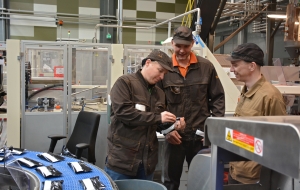Aluminium-free coffee packages for the world
The packaging material upgrade will demand active product development and careful planning.
 In the Sustainable Coffee programme launched in 2013, Paulig committed itself to enhancing the responsibility of green coffee and packagings. In autumn 2014, the Vuosaari roastery started up two new packaging lines which enabled the use of more environmental friendly packaging materials.
In the Sustainable Coffee programme launched in 2013, Paulig committed itself to enhancing the responsibility of green coffee and packagings. In autumn 2014, the Vuosaari roastery started up two new packaging lines which enabled the use of more environmental friendly packaging materials.
"This step is a part of our broad responsibility programme extending to 2018, in which will we update all of our packagings. Our aim is to reduce use of all packaging materials and to increase use of renewable raw materials. We expect these actions will bring about savings in the greenhouse gas emissions from packagings and a considerable reduction in the environmental impacts of our packages," Senior Sourcing Manager Kai Eira reports.
The packaging material upgrade will demand active product development and careful planning. "Aluminium makes the laminate packages oxygen-tight, and it makes the material mouldable and easy to transport on the lines. When we give up aluminium, these issues and others will have to be resolved, and we will have to invest in new machinery. In 2014, we totally revamped the packaging for tens of products, also in their appearance and form. Careful planning yields results, because the savings in materials were considerable once again; last year already, we used over 96,000 kg less packaging material than the year before," says Kai Eira.
The world of packaging has entered a new age for many reasons. Environmental awareness, reforms of waste laws, and producer liability, combined with innovations, are taking the packaging industry ahead at high speed. "We are watching the development of biodegradable packagings with particular interest, and we have also conducted tests with them. At the moment, their manufacture uses valuable raw materials from the food chain, such as maize, potatoes or sugar cane, but we also see potential for biodegradable materials as cellulose fibre-based alternatives are developed," Kai Eira delineates.
